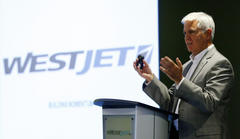 The federal government wants to let Canada’s airlines fly with fewer flight attendants, a move that one union says is a threat to passenger safety.
The federal government wants to let Canada’s airlines fly with fewer flight attendants, a move that one union says is a threat to passenger safety.Transport Canada this week granted WestJet an exemption to the existing rules, allowing the airline to operate with one flight attendant for every 50 passengers, instead of one cabin staff for every 40 passengers.
And the department quietly signalled this week it intends to change the rules so Canadian carriers can fly with fewer flight attendants in the future — seven years after rejecting the same move because of safety concerns.
“The department has considered WestJet’s request carefully and is confident that the same levels of safety will be maintained,” Transport Minister Denis Lebel said in a statement Monday.
Transport Canada said the exemption puts WestJet on a competitive footing with international standards, saying that airlines based in the United States and other countries operate with one flight attendant for every 50 passenger seats.
“This decision will make WestJet more competitive with U.S. airlines while maintaining a high safety standard,” Lebel said.
The department also said it would “begin work on a regulatory change so that airlines can meet this internationally-recognized standard without seeking an exemption.”
That was a surprise to the union representing 10,000 flight attendants in Canada which warned that fewer cabin staff will mean less help for passengers during emergencies inflight or on the ground.
“What does competitiveness with U.S. airlines have to do with the safety of these employees and the flying public,” asked Paul Moist, national president of the Canadian Union of Public Employees, which represents flight attendants at such airlines as Air Canada, Air Transat, Canjet and Sunwing.
“It deserves much more debate than an innocuous news release,” Moist said in an interview.
He noted that in the wake of the Sept. 11, 2001 hijackings, pilots are sealed behind a locked door in the cockpit, leaving flight attendants to cope with inflight disruptions, such as unruly passengers or security threats.
“It’s you and flight attendants and no one else,” he said.
Moist said the move is especially surprising given that the Conservatives rejected taking that very step in 2006. Then Transport Minister Lawrence Cannon said at the time that the government was “committed to aviation safety” and recognized the “important contribution that flight attendants make, particularly with respect to the orderly evacuation of aircraft.”
New Democrat MP Olivia Chow called the announcement “downright dangerous.”
“It is compromising the passenger’s safety,” she told the Star. “They are trying to slip it through.”
Chow noted the 2005 crash of an Air France jet at Pearson International Airport when flight attendants helped hustle 297 passengers to safety without a fatality after the Airbus overran the runway while landing and burst into flames.
“When there is an accident, when there is a problem, the flight attendants are the first responder,” Chow said.
Transport Canada refused to make anyone available Tuesday for an interview to provide clarification about the impact of the proposed rule change.
WestJet president and CEO Gregg Saretsky told analysts during a conference call that the rule change helps “level the playing field” for Canadian airlines, by adopting the U.S. and international standard.
The airline, based in Calgary, said the move is expected to bring about $30 million in annual cost savings, though WestJet said no jobs will be effected.
Saretsky added that in conversations with Lebel, WestJet made it clear the rule change isn’t about Air Canada versus WestJet.
“It’s more about as we expand into the U.S., making sure that we have a cost-structure which is competitive with the players we are now going to be competing against,” Saretsky said.
“He made it clear in his pronouncement (Monday) that the one-in-50 is available to all Canadian carriers. So over time, I would expect they will move in that direction,” Saretsky said.
Air Canada spokesman Peter Fitzpatrick said the airline will study this change.
“We’ll evaluate this industry development with a view to ensuring we remain competitive in all the markets we serve,” Fitzpatrick said, adding Air Canada as well as its new leisure carrier Rouge, which launches in July, will seek exemptions on select aircraft types as needed.
Earlier this year, flight attendants with Air Transat agreed to cost-cutting measures that include one fewer flight attendant on its wide-body Airbus 330 planes, which hold about 345 passengers. Instead of 11 flight attendants, there will now be 10. Reported by Toronto Star 11 hours ago.